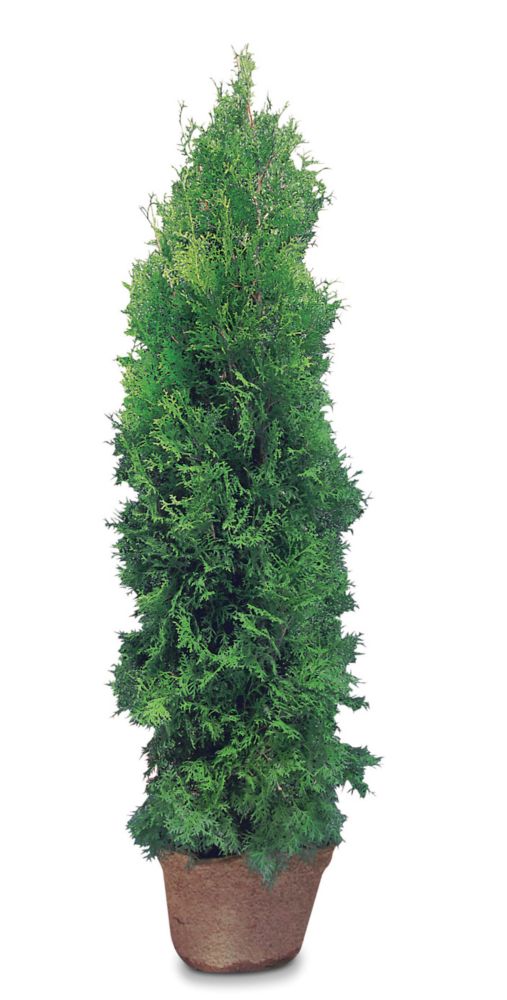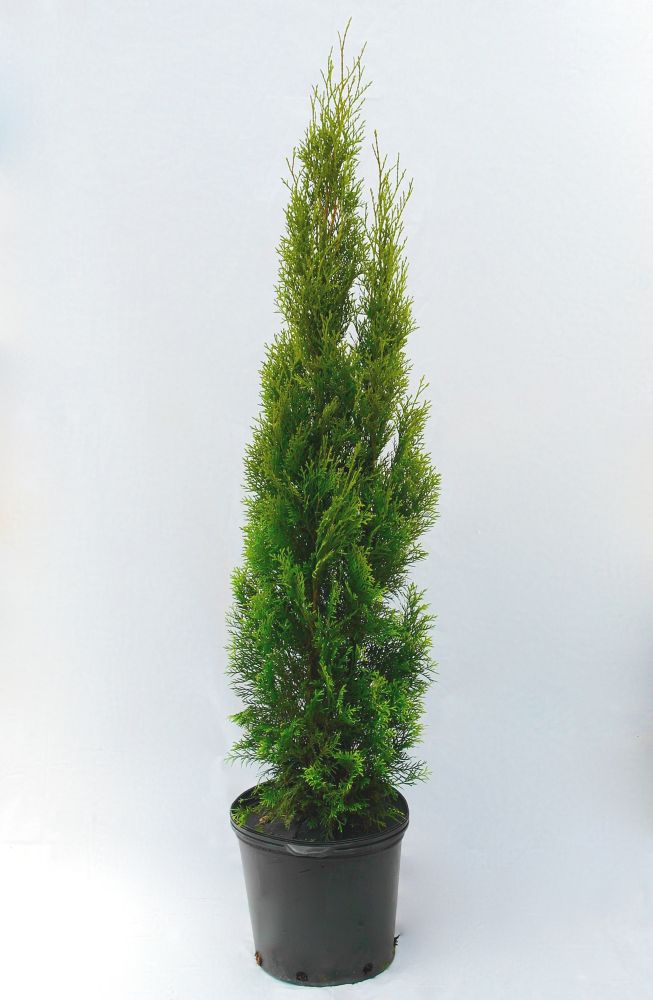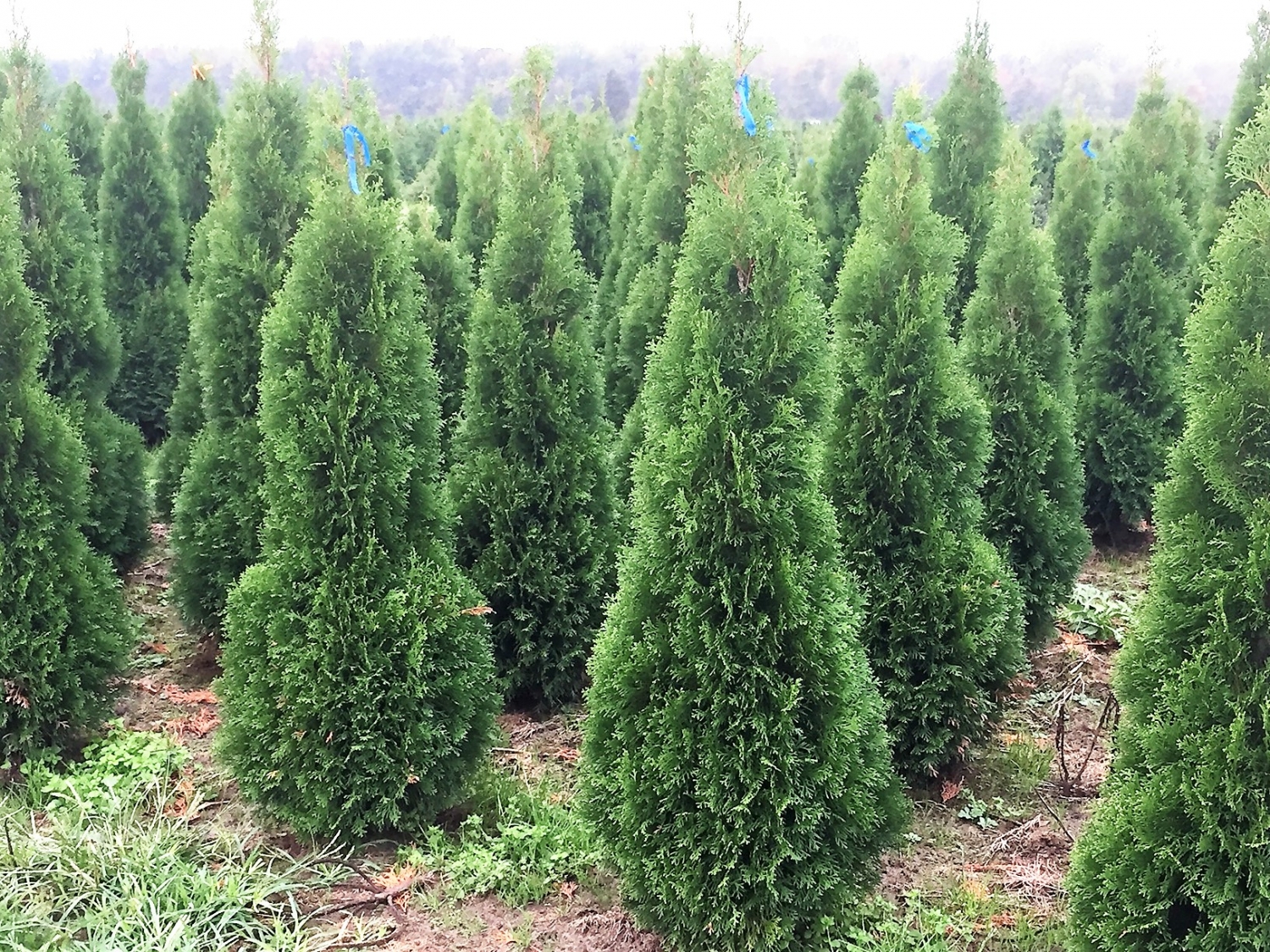Emerald Cedar

Emerald Cedar
Emerald Cedar 'Emerald Green' (Thuja occidentalis) Care Guide. Plant in spring or early fall to give plants the best start. Choose a location that will allow roots to spread and branches to grow freely. Space plants far enough from building foundations, walls, and decks so that the growing foliage won't crowd the structure.

How to Grow Emerald Cedar? — Tips for Raising Arborvitae
Check Out Cedar on eBay. Fill Your Cart With Color Today!

emerald cedar Maple Lane Nurseries & Landscaping
Emerald cedar arborvitae is a common tall shrub or small tree that works well for creating screens and borders. If your emerald cedar plant has leaves that turn brown, drought is usually the cause of the issue, but sometimes insects, diseases, or even dog urine can be the culprits.

Cedar Emerald Cedar The Home Depot Canada
Emerald Green Arborvitae trees, also known as 'Smaragd' due to their Danish origins, grow in a narrow pyramid shape, eventually to 10-15 feet tall and 3-4 feet wide. Their size makes them ideal foundation plants and natural privacy screens in smaller yards and narrow spaces. These trees can grow up to 1-2 feet per year until established and.

Landscape Basics 38inch x 15inch Emerald Cedar Tree (Grows to 15 ft
The Atlas cedar tree is a type of true cedar tree that looks similar to varieties of Lebanon cedars. This type of conifer tree gets its name from the Atlas mountain of Morocco. Atlas cedars are not as tall as other trees in the genus Cedrus, but they may have a conical shape that gives them ornamental value.. Also called the Atlanta cedars, these cedars are suitable for planting in large.

THUJA OCCIDENTALIS 'SMARAGD' Emerald Cedar Camson Creek Cedars
Emerald cedar is an evergreen coniferous tree that is native to the Mediterranean region. The tree reaches a height of 20-30 m and has a diameter of 60-90 cm. The leaves are dark green and needle-like, and the cones are ovoid and brown. Emerald cedar is a popular ornamental tree and is used in landscaping for parks and gardens. Popular name.

Emerald Cedar Trees for Sale Florae Farms
When planting a cedar hedge, first dig all of your holes, making sure to follow the rule of thumb of digging as deep as the rootball and twice the width. Be prepared to plant all the Emerald Cedar trees all at the same time. When planting the Thuja trees, make sure they are standing upright, as a crooked hedge will detract from the desired.

How to Grow Emerald Cedar? — Tips for Raising Arborvitae
Planting Emerald Cedars, (Arborvitae) great for green fence ideas, and they make a nice background for your garden!Disclaimer: These videos are intended as e.

Cedar Emerald
Thuja occidentalis, also known as northern white-cedar, eastern white-cedar, or arborvitae, is an evergreen coniferous tree, in the cypress family Cupressaceae, which is native to eastern Canada and much of the north-central and northeastern United States. It is widely cultivated as an ornamental plant. It is not to be confused with Juniperus virginiana (eastern red cedar). . Common names. Its.

Emerald Cedar Davenport Garden Centre
Emerald cedars grown in BC struggle to withstand our freezing temperatures and the drying winds that whither unprotected trees. A healthy, lush Emerald Cedar grown in BC and planted in Ontario in the early spring when temperatures are lower and rains plentiful, often doesn't make it through its first harsh Ontario winter.

emerald cedars 200+ Tree, Country roads, Cedar
Here are some tips on how to prepare your Emerald Cedars for the winter in Ontario. Step 1: Prune your tree. Before the winter sets in, prune your Emerald Cedar to remove any dead or damaged branches. This will not only improve the tree's appearance but also help to prevent damage from heavy snow or ice. Be sure to use proper pruning techniques.

Emerald Cedar 'Emerald Green' (Thuja occidentalis) My Garden Life
Planting Emerald Cedars (Thuja occidentalis 'Emerald') is a great way to add a touch of greenery and texture to your outdoor space. Emerald cedars grow to be large evergreen trees and can be planted in many different types of soil. The best time to plant an emerald cedar is in the spring or fall when

Everything you need to know about how to plant an emerald cedar Artofit
Step 1: Pick the proper location. Make sure your Emerald Cedar is in full sun and well-drained soil when picking a placement. The tree prefers a soil pH range of slightly acidic to neutral. Additionally, it's crucial to think about the tree's mature size and make sure there is adequate room for it to grow.

Ontario Grown Emerald Cedar
Step 2: Space Emerald Cedar Trees. Place cedars for hedging in the trench, still in their pots, so their trunks are 2 feet apart. Use a measuring tape so the trees will be evenly spaced. If you need to determine how far from a neighboring tree a single, freestanding cedar should be planted, add the mature width of both trees together and divide.

Emerald Cedar Green Tree Nursery Inc.
An emerald cedar tree grows up to 25 feet tall and 8 feet wide. However, the tree's growth slows down considerably when it reaches 15 feet tall and 4 feet wide. If you're growing emerald cedar as a specimen tree, plant it so that its trunk is at least 4 feet from a wall, fence or the edges of other trees or shrubs.

Emerald Cedar 5' Container Grown Sold Out for the Season Fraser
Arborvitae are evergreen trees that are easy to care for, have year-round visual interest, and are perfect for hedges, accent trees, or a green privacy wall. Arborvitae come from the Thuga genus, and 'Emerald Green' is one of the more popular arborvitae cultivars. They grow fast up to 20 feet tall. They can withstand cold temperatures and rarely have problems with pests and diseases.